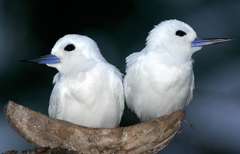Biased sex ratios predict more promiscuity, polygamy and divorce in birds

(Phys.org) —Birds in female-dominated populations are more likely to ditch and 'divorce' their mates while promiscuity increases in predominantly male environments, according to new research.
A joint study by the University of Sheffield and the University of Bath gives the first conclusive proof that rates of divorce and infidelity in birds are affected by the adult sex ratio of the population they live in – a theory previously discounted by biologists.
The study, which examined the pair bonding and mating behaviour of 197 different species of bird, found the divorce rate was higher in species with a female-biased sex ratio.
However, when the number of males outweighed females, the frequency of extra-pair mating increased in socially monogamous birds.
The Marie Curie funded research, published in the journal Current Biology, also found both sexes were more polygamous when the ratio was skewed towards the opposite sex.
Professor András Liker, Marie Curie Research Fellow at the University of Sheffield during the study, said: "If there is more of one sex than another, members of the rarer sex have a higher chance of getting a new partner for breeding than members of the common sex.
"Basically, the rarer sex has more opportunity to 'play the field' and either cheat on the partner or leave in favour of a new mate.
"Many animals form pairs to mate and then look after offspring. However, in animals as well as in humans, couples may not be permanent – divorce and infidelity are remarkably common."
Professor Tamás Székely, of Biodiversity Lab at the University of Bath, said researchers were interested to observe that both sexes 'play the game'.
"If there are lots of unpaired members of the opposite sex, there is more opportunity for the rarer sex to attract several partners," he added.
"We found that a female bias in sex ratio destabilises the pair bond system, although it is unclear as to whether this is due to lots of unpaired females luring males away from their mate or if the male, given a greater choice of partners, decides to switch partners more frequently.
"We also found that extra-pair mating was more common when there were more males than females - this could be due to females 'shopping around' when they have more males to choose from, or it could be that there is more rape by males unable to secure a permanent mate.
"Biased sex ratios may destabilise pair-bonds and increase marital infidelity, although relevance of these findings for other species need to be thoroughly tested."
Professor Robert Freckleton, of the University of Sheffield's Department of Animal and Plant Sciences, said the role that sex ratio plays in human mating behaviour should be studied further.
He added: "Surprisingly, some of our results in birds have striking parallels in human societies – for example, the frequency of divorce is related to sex ratio in some human societies in the same way.
"These results suggest that adult sex ratio may have an important role in shaping mating behaviour in a wide range of organisms, and deserve further investigations both in humans and non-human animals."
Journal information: Current Biology
Provided by University of Sheffield

















